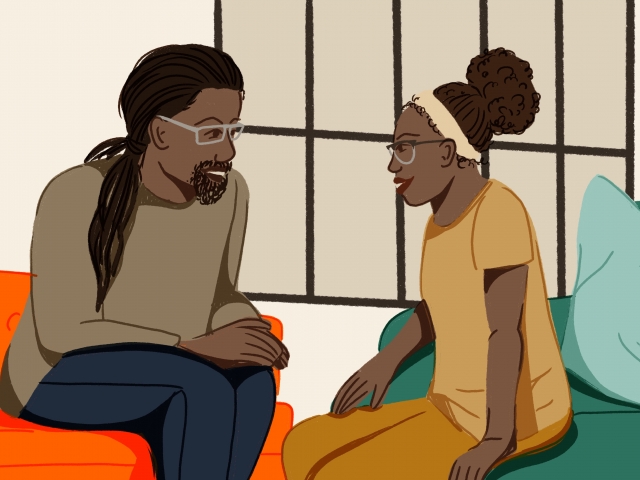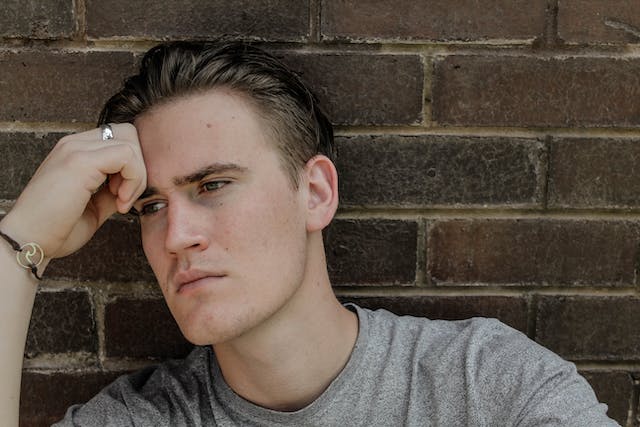Happiness
Episode 69: What’s Your “Why” in Life?

DACHER KELTNER We started the Greater Good Science Center here at UC Berkeley almost 20 years ago to provide resources that foster health, resilience, and connection. We now offer live and virtual events, free online articles, and of course, this podcast. And so much of what we do is made possible by donations from listeners like you. If you’d like to support our work, please visit greatergood.berkeley.edu/donate and give what you can. Every donation helps. Thank you and I hope you enjoy this week’s show.
ADRIAN MICHAEL GREEN Jaden!
JADEN MOORE Hey, Mr. Green.
ADRIAN MICHAEL GREEN How are you?
JADEN MOORE I’m doing pretty good.
ADRIAN MICHAEL GREEN So we’re gonna ask these questions that will help potentially start thinking about purpose. First question I have is what’s most important to you in your life?
JADEN MOORE For me, I would say it’s the people that I surround myself with, the people that inspire me and the people that will always support me, people that make me feel well and make me feel loved and good.
ADRIAN MICHAEL GREEN How do you define purpose? Like what is purpose to you?
JADEN MOORE Purpose. Wow. When you find that thing that makes you feel like yet this is where I am needed to be. This is that that’s. That was a gaping hole. And it’s full now. I feel like that is where your purpose is. I guess that’s how you can define purpose.
ADRIAN MICHAEL GREEN Are you in your purpose?
JADEN MOORE Yes. Yeah, I definitely feel it. I mean, I, I’m not the biggest fan of quarantine cause I don’t get to be around all the people that do inspire me. But I do feel like I’m getting on the phone with people and always giving it my all. That is a purpose for me to respect, to be respectful, inclusive, safe and kind.
ADRIAN MICHAEL GREEN You know, in our households and the African tradition of Sankofa, it literally translates to mean, “To go back and fetch it.” Hey, what does it look like to help someone in need? What does it look like when challenge arises? Do you falter or do you support? Even though now the language we use, the buzzword we use is purpose, that wasn’t really the language in my household that really was around responsibility to give back.
DACHER KELTNER Adrian Michael Green is an author, diversity trainer and the director of School Success for Project WayFinder, an organization helping adolescents strengthen their identity and sense of meaning in their lives. For our show, Adrian Michael spoke with one of his former students and tried a science-based practice designed to help young people explore and gain focus on their purpose. Adrian Michael, thanks for joining us on The Science of Happiness.
ADRIAN MICHAEL GREEN I am deeply excited to be here, especially during this time of challenge and difficulty. So I’m grateful for the time that we have together.
DACHER KELTNER Thank you. I think one of the hardest problems in society is focusing adolescents on their own personal purpose. I’m really curious, like, how did you get to that focus in your own life, how did that develop?
ADRIAN MICHAEL GREEN I think it’s just been inherent to say, OK, let’s sit down and figure out how we can navigate difficulty and not just difficulty, but in the midst of this world we live in, your responsibility is to do good in school. It’s like just beaten in our brow –– hey, your job as a young person is to go to school and get an education. And that’s been, you know, the mantra and the black community always of education as a practice, as a form of freedom. Education has always been that vehicle. Always, no matter where you come from, your beliefs, your ideologies, But I think the surrounding atmosphere there isn’t that space. And I think that’s the challenge. We are not just today, but historically, how can we provide questions. We call on big questions. And the sad thing is they’re not big. They should be, you know, the ones that you’re asking and rattling off to all people every single day, because even the students at Berkeley, when we used the work of Way Finder with them, they’re like, ‘no one ever asked me this or asked me these questions.’
DACHER KELTNER What kinds of questions?
ADRIAN MICHAEL GREEN Questions like, “What are parts of your identity? What is your story? What can you learn about yourself from others?” Questions like what matters to you. And why do you care?
DACHER KELTNER And those kinds of questions are part of the practice you chose to do for our show. It’s called Talking with Teens about Purpose, which is pretty much your job. Can you walk us through it?
ADRIAN MICHAEL GREEN The practice is a five to forty-five minute conversation with a young person about purpose. And there’s six questions that will, you know, lean into their life. And you know, what’s interesting is I chose to write out the questions and send them to a student and the student responded and then we jumped on a call. And when I tell you that was like the most powerful experience that I’ve had lately, I’m not just saying that, it was, it was real. That simple questionnaire, really jump-started something special.
DACHER KELTNER So who did you do the practice with?
ADRIAN MICHAEL GREEN Jaden Moore, who is a sophomore at Colorado Academy in Denver, Colorado, where I used to be a teacher. And I hadn’t talked to Jaden in two years. I taught her when she was in seventh grade.
ADRIAN MICHAEL GREEN I think we talked for about an hour and a half, to be honest. I said, can we jump on a Zoom call? And then about four days later, we engage in this really beautiful conversation that just reminded me of the importance of face-to-face, or Zoom right now, face-to-face communication is not just healing, but important for both parties.
ADRIAN MICHAEL GREEN If you were to look back at your life, how would you want to be remembered and granted say you live a long, long, long life. What do you want people to say about Jaden Moore?
JADEN MOORE I would like people to say I gave my heart in everything that I did. I loved everything that I did. And I would also like to be remembered as the person that tried our best to be fair but to also not pass judgment on other people.
ADRIAN MICHAEL GREEN I think the most special parts were how gentle she is with herself. And knowing that it is her sophomore year and she herself is trying to navigate what it looks like to be at home by yourself in terms of like yours, your school experience, and still be connected to your peers and still do your classwork and still be a great, thoughtful daughter. You know, all these things are happening in real time for her. And the way that she has been navigating it has been inspiring, to say the least.
DACHER KELTNER What were some of the questions that really jumped out at you in terms of producing really good conversation?
ADRIAN MICHAEL GREEN I think one that stands out the most was the question that sparked around ‘what does it mean to have a good life and be a good person?’
JADEN MOORE I think to be a good person, you have to be truthful to yourself, to always be willing to learn more, to experience more, to step into other people’s shoes and to be selfless. You have to stay true to yourself if you want to live life to the fullest.
ADRIAN MICHAEL GREEN Jaden, where does your drive to stay true to yourself come from?
JADEN MOORE I was bullied a lot in lower school actually. And I would try and fake my way out of everything all the time. I remember it very clearly. And in middle school, I was like, you know, I’m not doing that anymore –– I’m not going to keep letting myself do what other people expect of me. And that’s not how I want to live.
ADRIAN MICHAEL GREEN As a 10th grader, like her wherewithal, her awareness, her and her ability to be true to herself, no matter what is, I think that that’s at the heart of our conversation with blew my mind.
ADRIAN MICHAEL GREEN What’s like one huge accomplishment that you would like to be known for as well, like Jaden Moore was ... dot, dot, dot.
JADEN MOORE Giving it her all. I guess. Jaden Moore gave it her all and in everything that she did. I’ve been doing a lot of rallies –– before quarantine and all that, I was actually going to go to city hall for gun violence prevention. I spent earlier this year in September, I went to Washington, D.C. and I talked to senators, representatives about gun violence prevention. I would actually like to be remembered for that, too.
ADRIAN MICHAEL GREEN Yeah, I love that. Jaden Moore gave her all. Wow, that’s beautiful.
DACHER KELTNER What are some of the deeper themes that overlap with the work that you do that you see in this kind of conversation with Jaden?
ADRIAN MICHAEL GREEN It was it a thoughtful nod to, no matter how you do it, There’s many ways to get to purpose. To get to the deeper meaning of your “Why.” It provides space and time for students to really take an honest inventory of who they are. You know, in terms of self discovery, what is personally meaningful to, you know, what matters outside of yourself, beyond yourself, and then taking these tools that you gather along the way to say, all right, now that I know I love to do, and now that I know what my strengths and skills are, and now what I know what I care about in the world, now, I know those three basic things, what can I do with it? Like it’s my job, my responsibility to do something with it. And they think the questions from Jaden of,”Hey, what’s important to you?” And her telling me: being around positive people, people who support me, people who care, helping me achieve my goals. If I was her teacher right now in her school and I know her “Why” I know what’s important to her, then not only do I remind her of that, but I can say, “Ooh, she’s doing this because X, Y, Z. I know her “Why.”
DACHER KELTNER I want to ask you, Adrian Michael, a lot of your work focuses on students of color and in particular African-Americans. And when I look at the empirical research of teachers and principals disproportionately suspending African-Americans and police brutality and under-resourced schools. In light of all this, what kind of conversations do you have with African-Americans about purpose facing these sources of discrimination?
ADRIAN MICHAEL GREEN You know, one of the myths that we bust straight out is that purpose is not just for the privileged. Purpose is For everyone. But sometimes the lived experience and the reality is that there are a lot of things bumping up against not just the practice of purpose or living into your purpose, but what does it look like when you’re trying to live? You’re trying to breathe? You’re trying to enact a life of just freedom and doing things that fill you with joy and happiness and meaning? But bumped up against that is the kind of unending trauma, the unending reminders from police brutality or just issues around policing in neighborhoods, right? From people who aren’t policemen, policewomen. So I think the conversation that I have from young people around the world, from social media to in person is, you know, “What do you need right now to be OK? What is it that will allow you to remind yourself that this is not just temporary, but you aren’t the problems that exist in the world. But guess what? There is time to be angry. And there’s time to lean in with people who you call community.” That’s where affinity groups are so important on all campuses, schools, programs, organizations. If you don’t have, or believe in affinity groups, then you really don’t know what wellness and well-being is about. Because my experience, you know, I’ve grown up and have to and still have to navigate predominantly white spaces where I know, I can viscerally feel, if I’m safe or not, just based off of what I see and what I don’t see. Yeah. Students across the world know that innately. “Hey, if I’m here, am I safe? Can I be my full self? How can I code switch from this professor to this space to this situation so that I can come home safe?” So I think the big thing that really carries through is not just having the safe space, but the tools to be resilient. And we know the research and just experience, that people of color are already being successful and they’re the most resilient because of all the things that are thrown at us, you know, and we’re prepared for anything. But also it’s unacceptable that we have to be prepared for all of these things.
But what helps me, and why I love working with young people, is their desire to be seen and loved. And the only way that I can inspire is to remind them that they are the inspiration. They’ve always been the inspiration. You don’t have to have a really strong skill set to care. You just have to care. I think the more that you can do that and say, all right, there’s some challenge, but purpose does not come without challenge.
DACHER KELTNER Yeah, Absolutely. Adrian Michael, we know when you study purpose in teens, you see this wonderful constellation of benefits. They cope better. They’re more resilient. They’re happier. They sleep better. They have less anxiety. But you have this great privilege of watching young people like Jaden grow and change. How would you put your finger on, like, what this inquiry into purpose really does for students?
ADRIAN MICHAEL GREEN I think the most important thing that it does, it gives them a pulse on themselves. It gives them language and tools and a practice. And these questions, these activities, these prompts, these opportunities. Just give them the permission to really say, huh? What does bring me Joy? What do I love to do? What? What are my strengths? Where do I feel capable?
ADRIAN MICHAEL GREEN I think what I see is the practice of it, the living desire to know that they have inner resources and tools and language to get through situations that are challenging or they know, “Hey, if in fact, I’m having a stressful moment or I’m having difficulty with a loved one or a person in my classroom or an educator.” They know that they have language they have the ability to say, OK, hold on. I’m stressed. what’s important to me is reading or music or time with friends. I’m going to go do that. I know if I’m struggling with this, I talked about it. I’m going to do that because when I don’t do it, then I stay negative. And then when I’m negative, I negatively impact people. And this is a ripple effect that happens. So what I find is that there’s this ongoing conversation that they can always return back to their toolkit, because purpose is not just the, “Check the box, I’m done.” Purpose comes in all forms, all walks of life that you return to it over and over and over.
DACHER KELTNER I know adolescents and teens feel as I did when I was an adolescent and teen, that there are a lot of adults around them, teachers and parents and authority figures who are kind of telling them what they do and they never ask them questions. And we’re in a moment with COVID-19, where families are spending more time with each other. Teachers have new relationships with their teens. And I want to close with just a question, Adrian Michael: what’s the one question you’d have? Our listeners asked those teens at the dinner table on Zoom to get this kind of inquiry going?
ADRIAN MICHAEL GREEN I think what comes to mind directly right now is, “How is your heart?” It’s a beautiful check in that really gets you out of your head because we can try to rationalize that. I’m good. And then be OK with it. But what does “good” really mean? You know when students hit you with a knife? You asked how my day was going to say I’m good because that’s the practice of just the normalization of how we respond to people. How doing? Good. And, you know, it’s like a really quick pass. But I think when you ask how is your heart, people like stop. Wow. Well, that’s like. What do you mean? How? It’s like, how is my heart? How am I really doing? Because at the heart of purpose is people. And if you are unable to really hone in on how you’re feeling and try to bypass yourself and you came and talk about purpose at all, you really can’t because your well-being and your inability to even think about how you show up in the world is dismissive of yourself, actually has negative consequences to other people who share space with you, whether you know it or not.
DACHER KELTNER Well, Adrian Michael, thank you so much for your work. You do for your teaching, for your writing and for being on the Science of Happiness today.
ADRIAN MICHAEL GREEN It’s been a pleasure. Thank you so much. I really appreciate you and your work that you do.
DACHER KELTNER Having a sense of purpose in life is linked to lots of different benefits, from better health to better grades.
KENDALL COTTON BRONK And I think knowing this, it’s important to step back and think about, what are the steps involved in discovering and pursuing a purpose in life?
DACHER KELTNER The core idea of purpose is having a meaningful, long-term goal that you invest your time and energy in. And it’s often inspired by a desire to make a difference in the world.
KENDALL COTTON BRONK In experience, having conducted hundreds and hundreds of interviews around purpose, is that most of our conversations with young people focus on short term issues. You know, what class are you going to take up next semester? What colleges are you going to apply to? And it’s really rare that we step back and ask young people, what do you really want to accomplish in your life? What’s important to you? And why do you care about this?
DACHER KELTNER Kendall Cotton Bronk is an associate professor of psychology at Claremont Graduate University. She researches how purpose affects the development and moral growth of young people.
KENDALL COTTON BRONK We find that young people, adolescents and young adults, often report feeling kind of a sense of drift. You know there’s so many options available today that it can feel almost overwhelming. Like, which way do I move forward? And so when you have a purpose in life it provides a pretty clear path forward.
DACHER KELTNER Leading a life of purpose is associated with more academic success, job satisfaction and better mental and physical health. Kendall figured that if she could better understand people who have managed to discover and follow their own purpose, she could help others reap those benefits. So her team identified nine adolescents who seemed deeply committed to a purpose –– issues ranging from access to clean water to gun violence prevention to supporting cancer research.
KENDALL COTTON BRONK We sat down and we conducted interviews that lasted around 90 minutes each. We also interviewed a parent and somebody with whom they were working.
DACHER KELTNER Then they did follow-up interviews over the course of five years. Kendall’s team found that at the time of the initial interviews, the teens had started to get involved in activities that were relevant to their sense of purpose, but they began with some pretty modest steps.
KENDALL COTTON BRONK So, for example, you know, the young person who ended up being really committed to supporting research around cancer, she got involved when she was actually a child and she was just selling daffodils at a nationwide fund raiser called Daffodil Days.
DACHER KELTNER They also found that mentors outside of the family played a big role in shaping their sense of purpose.
KENDALL COTTON BRONK Adolescence is a time where even positive feedback from within the family is really not as effective as positive feedback from adults outside the family. I think anybody who has an adolescent at home knows that when you tell the adolescent, wow, you’re really good at math as the parent anyway, it kind of goes in one ear and out the other. But when a teacher or a coach or even a friend’s parent, you know, some adult who the young person respects from outside the family gives that same feedback, it takes on a different meaning.
DACHER KELTNER But Kendall says that parents can still play a big role by modeling purpose in their own lives, and by asking their children about the things that matter most to them –– and then really listening to their responses without nudging them in a particular direction.
KENDALL COTTON BRONK I also think, you know, there are rules that adults can play in helping to connect young people with opportunities to become actively engaged in the things that they think they might care about.
DACHER KELTNER People are uplifted by having a sense of purpose in life. But finding their purpose can take some time and support –– and often involves a bit of meandering and change.
KENDALL COTTON BRONK And so it is possible that if you engage in this conversation with the young person and you feel like it didn’t have the desired effect, we didn’t get it all figured out. Maybe they’re just not there yet. And that’s OK. You started the conversation. You got this sort of language, an idea on the radar. And if you can continue to have this conversation when they’re ready for it, they’ll have the idea. They’ll have the language and they’ll be in this habit of thinking really about. About, you know, how it is they want to leave their mark in the broader world.
DACHER KELTNER I’m Dacher Keltner, thanks for joining me on The Science of Happiness.
You can check out the Talking with Teens about Purpose exercise on our Greater Good in Action website, at ggia.berkeley.edu.
We’ve created resources exploring the psychology of racism and ways to confront it in yourself and talk about it with the young people in your life. Visit greatergood.berkeley .edu/antiracism to learn more—that’s greater good dot berkeley dot E D U slash antiracism.
Our podcast is a co-production of UC Berkeley’s Greater Good Science Center and PRX. Our senior producer is Shuka Kalantari. Production assistance is from Jennie Cataldo and Ben Manilla of BMP Audio. Our associate producers are Brett Simpson and Ariella Markowitz. Our executive producer is Jane Park. Our editor-in-chief is Jason Marsh. Our science director is Emiliana Simon-Thomas.
Tell us what you’d like to hear more of by using the hashtag #HappinessPod or emailing greater@berkeley.edu.





